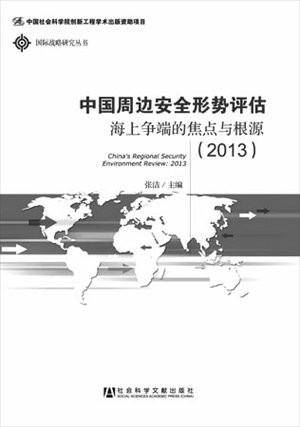New assessment of security environment gives cause for optimism

Island disputes have become more prominent in areas surrounding China in the past year. The US' "rebalancing" strategy and "maritime disputes" have become two keywords describing the security situation surrounding China.
This argument has been raised by Zhang Jie, a researcher at the National Institute of International Strategy at the Chinese Academy of Social Sciences, in her new book China's Regional Security Environment Review: 2013, published on January 1 by China Social Sciences Academic Press.
The book goes through changes in China's surrounding areas in 2012. Increasingly prominent island disputes have prompted adjustments to China's maritime policies. Many island disputes have escalated, and become the key element to regional stability and international relations in the Asia-Pacific region.
For a rising China, how to cope with these disputes has become an unavoidable question.
Domestically, China should strengthen its military and plan its maritime security strategy to take a multi-pronged approach to defuse the risks.
However, Zhang holds that current disputes have also had a positive impact. While worsening the situation in China's environment, they also promote adjustments to China's maritime policies.
The book sees the year 2012 as a turning point, as China began to take active methods to protect its rights from that point in time. In the future, there will be an urgent need for China to make national ocean security strategic plans.
The US pivot to Asia has also brought new changes. "Rebalancing" shows that the US strategy is gradually deepening its implementation. The main goal of this strategy is to maintain the US' dominant position in the Asia-Pacific region, and prevent China's rise from challenging the current regional order dominated by the US.
The book points out that indeed, this strategy can strengthen the US position in the region, but at the same time, it has also brought some risks to the US and even the region as a whole.
Due to the development of this strategy, relationships between powers in this region have become much more complex, and small and medium-sized countries are facing the dilemma of being forced to choose sides in a complex web of relationships.
Due to these changes, China faces some major challenges in 2013: maritime disputes, the US, Japan and India's moves in the Indo-China Peninsula, and a new period of the Sino-US relationship in which each side may test the other after changes in their leadership.
Though the changes in regional dynamics have deteriorated China's surrounding environment, the book holds that the current situation is stable and controllable. It brings challenges as well as new opportunities to China.